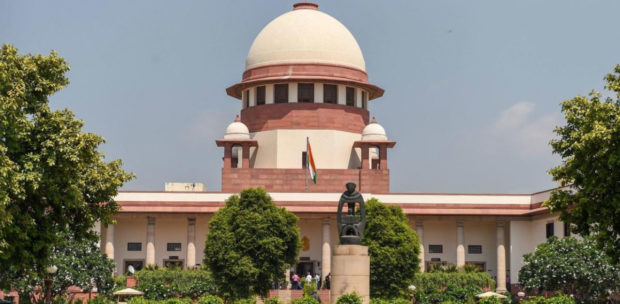
No rigid standard for acceptance or rejection of dying declaration: SC
PTI, Mar 27, 2021, 5:36 PM IST

New Delhi: The Supreme Court has said that there can be “no rigid standard or yardstick” for acceptance or rejection of dying declaration, which alone can form the basis for conviction if it has been made voluntarily and inspires confidence.
The apex court observed that if there are contradictions that create doubts about the truthfulness and credibility of the dying declaration then the benefit of the doubt shall have to be given to the accused.
A bench comprising justices Navin Sinha and Krishna Murari stated this in its judgement while dismissing an appeal challenging the August 2011 verdict of the Delhi High Court which upheld a trial court order acquitting two persons accused of subjecting a woman to cruelty and murdering her.
“A dying declaration is admissible in evidence under section 32 of the Indian Evidence Act, 1872. It alone can also form the basis for conviction if it has been made voluntarily and inspires confidence,” the top court said in its March 25 verdict.
“If there are contradictions, variations, creating doubts about its truthfulness, affecting its veracity and credibility, or if the dying declaration is suspect, or the accused is able to create a doubt not only with regard to the dying declaration but also with regard to the nature and manner of death, the benefit of the doubt shall have to be given to the accused,” it said.
The bench further said, “Therefore, much shall depend on the facts of a case. There can be no rigid standard or yardstick for acceptance or rejection of a dying declaration.”
The plea in the apex court was filed by a man who had challenged the acquittal of his deceased sister’s husband and sister-in-law in a case lodged in 1991.
The woman had suffered 95 per cent burn injuries in her matrimonial home on September 17, 1991, and succumbed in a hospital the next day.
The petitioner’s lawyer had argued that the accused were wrongly given the benefit of doubt by the high court that the deceased had committed suicide.
The apex court noted that the accused had taken the defence that the deceased suspected a promiscuous relationship between them and was also frustrated by her inability to conceive and, therefore, committed suicide by setting herself afire.
“In the facts and circumstances of the present case, considering that the statements of the deceased have vacillated, there is no evidence about the fitness of mind of the deceased to make the dying declaration including the presence of the doctor, the veracity and truthfulness of the dying declaration remains suspect,” the bench said.
“It would not be safe to simply reject the probable defence of suicide, to reverse the acquittal and convict the respondents,” it said, adding, “The appeal is, therefore, dismissed”.
Udayavani is now on Telegram. Click here to join our channel and stay updated with the latest news.
Top News

Related Articles More

Kharge urges PM Modi to conduct last rites of Manmohan Singh at a place where memorial can be built

DGCA orders suspension of 2 Akasa directors for lapses in pilots training

Ex-PM Manmohan Singh’s funeral at Nigambodh Ghat on Dec 28, says MHA

Punjab: Eight killed, many injured in Bathinda bus accident

Abducted and sold at 8, woman reunites with family after 49 years
MUST WATCH
Latest Additions

Two youths die after bike hits canter while performing stunt wheelies

Karkala: Thief posing as customer steals jewellery, escapes

Shivakumar seeks research centre at Bangalore University for Ex-PM Manmohan Singh

Kharge urges PM Modi to conduct last rites of Manmohan Singh at a place where memorial can be built

Shuttler Lakshya sails into semifinals of King Cup
Thanks for visiting Udayavani
You seem to have an Ad Blocker on.
To continue reading, please turn it off or whitelist Udayavani.



















